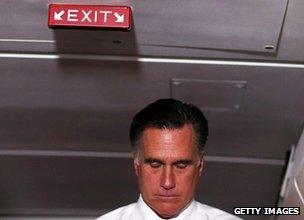Viewpoint: Republicans at a crossroads
- Published

In the aftermath of defeat against a vulnerable president, an inquest is under way in the "Grand Old Party".
Surveying the smoking rubble of the Republican Party's election hopes, the right-wing talk radio giant Rush Limbaugh made a declaration.
"Conservatism, in my humble opinion, did not lose last night. It's just very difficult to beat Santa Claus."
Read those two sentences carefully, for they tell you a lot about the massive psychological problem the Republicans face - and why it will be extraordinarily difficult and painful for them to deal with reality.
On his popular radio show, the highly influential Limbaugh explained in detail how the election results prove that the American people have become weak-minded, jelly-spined degenerates.
Why, they even allowed themselves to be bought off by a welfare-state liberal Democrat who promised them the moon!
Though it is hard to see how one builds a successful democratic political movement around blaming the demos for its collective stupidity and bad character, one must concede that Limbaugh may be right.

Limbaugh had said Romney would win
That is, it is always possible that the people of any given polity could have become so corrupted by greed, sloth, spite, or by all manner of vice, that its judgment fails. Boobs and knaves win elections all the time; sages and gentlemen lose.
Democracy means only that the people are sovereign; it does not mean that they are infallible.
Limbaugh's analysis will surely find many sympathetic ears on the American right.
The problem, obviously, is this self-serving conclusion frees us conservatives from having to examine critically our own principles, arguments, and strategies.
However grounded in reality, self-righteousness rarely leads to clear thinking about the way out of a slough of despond.
Compounding the problem is the Limbavian dogma, widely shared on the ideological right - Conservatism cannot fail, it can only be failed.
It is interesting to contemplate how conservatism, or Limbaugh's version of it, can ever fail?
If conservative candidates or conservative policies are rejected by voters, or conservative government shipwrecks itself with bad policy or plain incompetence, (case in point: the disastrous Bush administration) - well, isn't that a pretty clear sign of failure?
It is far easier to dismiss voters as fools and unsuccessful GOP candidates as wretched sinners unworthy of conservatism.
It was only yesterday, it seems, that frustrated American liberals salved their wounds after electoral thrashings by convincing themselves that voters were too bigoted or stupid to know what was good for them.
Back then, it was so clear to conservatives how misguided and self-defeating the liberal pity-party was.
Along those lines, I'm old enough to remember when American conservatives snickered at delusional campus Marxists who believed communism - holy and immaculate! - had not failed, it had simply never been properly tried.
Roman Catholicism holds a doctrine declaring the Church to be the "spotless bride of Christ". To be sure, Catholics recognise that this is a theological claim, not an empirical one.
Limbaugh and millions of grassroots conservative militants approach politics as if it were a dogmatic religion. For them, conservatism is the Spotless Bride of Ronald Reagan and nothing about it can be falsified.
If voters reject the religion of conservatism, it's because they are too sinful to see and embrace the truth.
That, or particular conservative politicians and strategists lack faith. Activist American conservatism has a name for such slackers and heretics: RINO, which means "Republican In Name Only".
To be denounced as a RINO by the likes of Limbaugh is to be identified as a snivelling outcast who, if it were possible, would have deceived the elect into soul-destroying compromise with liberals.

To treat politics as if it were a kind of religion is to make a category error. It is also to lose touch with reality.
An extreme example. During the French Revolution, Robespierre, who was no Christian but who did have a fanatical religious temperament, conceived of politics as a high-pitched pageant of purification.
As he saw it, the Revolution was eternally threatened by enemies - none more deadly than the wicked artificers he might have deigned Revolutionaries In Name Only.
That business did not end well for anybody. Granted, the Republican Party is not facing its own version of The Terror.
The point is simply that imputing politics with moral grandiosity and quasi-religious fervour makes deviation from ideology an extremely risky proposition.
Several more moderate Republicans lost their political lives to hard-right Tea Party primary challengers, who later proved too radical to win in Tuesday's general election.
"I went to bed last night thinking we've lost the country," said Limbaugh, on the day after. "I don't know how else you look at this."
So a plain-vanilla Republican like Mitt Romney losing a close election to Barack Obama amounts to the Conservative Apocalypse? Good grief. Where does this pants-wetting hysteria end?
The true-believing conservative grassroots and leaders like Limbaugh have constructed a perfect system of epistemic closure.
Under their framework, there is no need to rethink what conservatism means or how conservatives behave in light of new facts or changing circumstances.

Romney was never loved by parts of the party
And how circumstances have changed! Eight years ago, same-sex marriage was toxic at the polls. This year, voters in three states - Maryland, Maine, and Washington - legalised it.
What's more, the "McGovern Coalition" - the melange of white liberals, college students, young adults, racial minorities, and labour - upon which Democratic presidential nominee George McGovern built his catastrophic 1972 campaign, has now become the majority.
In the wake of Obama's triumph, political professionals of both the left and the right credit this trend, and warn that it is unlikely to reverse itself.
The demographic tide, which includes a dramatic waning of religious faith among younger Americans, is coming in too fast.
The Republican Party is becoming a perversely rigid sect, more concerned with being militantly correct than being pragmatic and successful. With each passing election cycle, their purity will become the purity of the desert.
There are many American liberals who counsel conservatives that all would come right for us again if only we would jettison our principles and become liberals.
No, thanks. Conservatives must be conservative, but we must also recognize that conservatism is not an ideology, but a way of approaching the world, the chief virtue of which is prudence.
As the great modern conservative Edmund Burke taught, the act of governing - indeed, "every human benefit and enjoyment" - requires compromise.
The talk-radio Jacobins and the suburban sans culottes may not like that kind of treacherous talk, but it is the essence of the conservative political temperament.
Burke once observed that "a state without the means of some change is without the means of its conservation."
He might have said the same thing about the Republican Party. Then again, the old boy was probably a RINO.